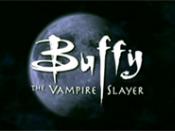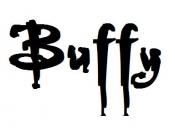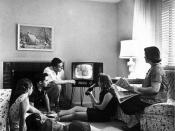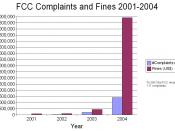TV Trash: Bag It Has television become more violent and vulgar? Yes. How does this affect America? More importantly, how does it affect America's children? The violence and vulgarity of American television affects Americans and their children in many ways, none of which are good or beneficial. In its entirety, violence and vulgarity on television is detrimental to American society, especially children.
Television has become much more violent and vulgar since its innocent beginnings, including obscenities and sexual innuendo as everyday language on Friends to murder and occult references on Buffy the Vampire Slayer to bare posteriors on NYPD Blue. Both Friends and Buffy the Vampire Slayer have aired between 6 and 9 p.m., what used to be "family hour" on television. If one looks back into the late eighties and early nineties, what were some of the shows on during the "family hour" on television? Full House, Family Ties, Family Matters, and Step by Step.
All of these shows were clean and unadulterated by violence, sex, and obscene language. The most violence shown was yelling in family or schoolyard squabbles, sex was limited to chaste kisses, and swearing never was heard on these shows. What ever happened to "TGIF" (Thank Goodness It's Friday) on ABC? This television lineup contained such wholesome shows as Full House, Family Matters, and Boy Meets World. In the April 14, 2000 edition of the Los Angeles Times, Brian Lowry wrote that "'TGIF' [is] the victim of shifting viewing patterns and a trend toward edgier fare designed to attract an increasingly jaded, been-there-seen-that audience." What is happening in American culture if people can't enjoy wholesome television anymore? The Parents Television Council (PTC) found that during family hour, the "combined per-hour average of objectionable content" had increased 75% from February of 1998, with nearly 7 references per hour that pertained to sex, violence, or vulgar language. Fox led the pack with 11 offensive references per hour. Surprisingly, they found the Disney-owned ABC averaged 3.47 sexual references per hour. Some ABC shows that have contained overt and obvious sexual references are sitcoms like Ellen, Spin City, and Dharma and Greg. However, among the broadcast networks covered by the study, including ABC, CBS, Fox, NBC, UPN, and the WB, programming on the Fox Network was deemed the most objectionable in the report, which noted that 100% of the network's shows contained what the PTC called "offensive material." PTC defined such material as references to sexual activity or sex organs, explicit acts of violent behavior, and vulgarities. Excluded from the criteria was "conduct such as kissing, flirtation and ambiguous suggestiveness" and milder profane language including words like "damn" and "hell." Does violence, sex, and vulgarity on television truly affect children's minds, and therefore their lives? Yes. The National Association for the Education of Young Children (NAEYC) reports that "television violence increases violent and aggressive tendencies in young people and contributes to the growth of violent crime in the United States." Many idiosyncrasies contribute to the influence of television on behavior. These include age, amount of television watched, identification with television personalities, belief that television violence is realistic, and intellectual achievement of the child viewer.
In Television, Imagination and Aggression: A Study of Preschoolers by J.L. Singer, Singer writers that a relationship between television violence and aggression has been observed in children as young as three. However, data suggests that the relationship is much more consistent for children between ages 8 and 12, as noted in American Psychologist, in an article entitled "Is TV to blame for violence?" by L.D. Eron, L.R. Huesmann, M.M. Lefkowitz, and L.D. Walker. The amount of television watched is also at blame for violence in children. "Aggressive behavior can be stimulated by frenetic, hectic programming that creates a high level of arousal in children," says Huesmann in "Television and the Aggressive Child: A Cross-National Comparison" in Journal of Social Issues. Young boys also have a tendency to identify with a character on television and that substantially increases the likelihood that the character's aggressive behavior will be therefore modeled. (Huesmann 65) If a child believes that television violence is realistic, he or she will be more inclined toward violent tendencies. (Huesmann 65) Finally, because children of lower intellectual achievement generally watch more television, they will in turn watch more violent television. They are also more inclined to believe violent television reflects real life, and will then behave more aggressively. (Huesmann 65) Perhaps more disturbing is the several simple factors that may heighten the likelihood of influence by television on children. According to G. Comstock and H. Paik in Television and Children: A Review of Recent Research, there are four reasons television may affect children: (1) the seeming normalcy of violence, sex, and vulgarity. Sometimes it is presented as justified and without consequence, (2) reward or lack or punishment for violence, sex and vulgarity on television, (3) similarity of violence, etceteras to reality of viewer, and (4) impressibility of viewer. The PTC reports that 45% of "bad" characters' violent behavior went unpunished and that an additional 39% of the violent character were portrayed as "good" or "heroic" figures.
Much evidence suggests that violence, vulgarity and sex on television does indeed affect America's youth. Just by watching television, one will notice how much more is being shown on sitcoms regarding violence, vulgarity and sex. How is this benefiting American children? It is not. It is hurting them. Don't children see enough vulgarity in everyday life? Can a child really pass the day without hearing obscenities in public? No student from middle school age through college can spend a whole day without being corrupted by violence, vulgarity and sex. America does not need such things to be also shown on television. It is beneficial to children, America's future, not to be corrupted furthermore through television. Television should be used to educate and benefit America, including children, not for corruption as it is being used for today in society.





